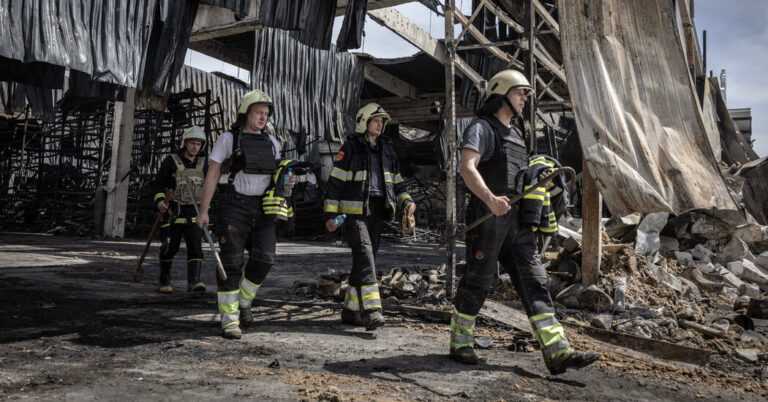President Volodymyr Zelensky of Ukraine said on Sunday that Moscow’s forces were massing for a new ground offensive on the northeast of his country, a day after a Russian missile strike on a hardware superstore in the city of Kharkiv killed at least 16 people and wounded dozens more, according to Ukrainian officials.
“Russia is the only source of aggression and constantly tries to expand the war,” Mr. Zelensky said in a speech delivered in English inside the ruins of a publishing house in Kharkiv that was destroyed last week in a Russian strike.
“Russia is preparing for offensive actions,” around 60 miles northwest of Kharkiv, he said, adding that Moscow was gathering “another group of troops near our border.” Mr. Zelensky gave no further details about the potential attack.
Moscow surprised Ukraine on May 10 when its troops poured across the northeastern border, punching through Ukrainian defenses and seizing villages close to the frontier. That forced the government in Kyiv to rush in reinforcements in a bid to halt the Russian advance.
One target for an assault, based on Mr. Zelensky’s comments, could be the Sumy region in northeastern Ukraine, which has seen frequent cross-border fire but no ground attacks since Russian forces attempted to seize its main city, also called Sumy, at the start of the full-scale invasion in February 2022. They were later forced to withdraw after fierce fighting. Ukraine’s military has previously warned of another Russian border assault in the northeast. A spokesman for Ukraine’s border guard service, Andriy Demchenko, told Ukrainian television on Sunday that it did not appear that the Russian forces gathered near the frontier were sufficient to mount a major attack.
But even a limited increase in Russian military activity near the border “could have the effect of stretching Ukrainian forces along a wider front,” according to the Institute for the Study of War, a research organization based in Washington. This would be true even if Russia only “threatens penetrations” of border areas beyond Kharkiv, the institute said last week.
The May incursion was the most significant in months of fighting, and military experts say that a key Russian objective was to expand the length of the battlefield, which already stretches hundreds of miles, and in that way force Ukraine to spread its troops more thinly. In doing so, Moscow apparently hoped to extend its existing advantage in terms of the size of its military, the experts say.
The war has ebbed and flowed since President Vladimir V. Putin of Russia launched the invasion, with Ukrainian forces now defending against Russian advances in the eastern region of Donetsk, in the northeast and in the southern region of Zaporizhzhia.
One immediate casualty has been Kharkiv, which has seen a sharp escalation in the ferocity of Russian aerial attacks this month, forcing many to flee. On Sunday, the death toll from the attack on the hardware superstore rose to 16, with another 43 people wounded, according to a social media post from the region’s military administration.
Fire fighters extinguished the flames at the superstore, the local authorities said, and 200 emergency workers were dealing with the aftermath of the attack, according to Oleh Syniehubov, the head of the region’s military administration.
The Ukrainian police service on Sunday posted a brief video it said showed the store’s interior at the moment of the attack. It showed customers browsing calmly amid displays of bathroom furniture including toilets and sinks as store workers dressed in blue T-shirts stood nearby. Suddenly, the scene is obliterated in a flash of light. There was no independent confirmation of the video’s authenticity.
Ukraine’s foreign minister, Dmytro Kuleba, said the strike had been conducted to ensure maximum civilian casualties. “He can’t occupy Kharkiv, hence he tries to kill it,” Mr. Kuleba wrote on social media, referring to Mr. Putin.
The Telegram social media channel of the Russian Defense Ministry has made extensive comments about fighting in recent days but made no comment about the Kharkiv strike or about others reported by Ukrainian officials, in keeping with its general practice.
Mr. Kuleba called on Ukraine’s allies in NATO to supply his country with more Patriot missiles and other systems that can defend against missile strikes.
A multibillion-dollar military aid package was stalled for months in the U.S. Congress, leaving Ukraine short of ammunition and increasingly exposed to Russian missile and drone attacks. The package finally passed last month, but much of the hardware has yet to reach Ukraine.
In a sign of Kharkiv’s vulnerability, Mr. Syniehubov reported on a second strike on Saturday, which he said hit civilian commercial infrastructure in the center of the city just hours after the attack on the superstore. At least 25 people were wounded, including a 14-year-old boy who was hospitalized, according to the regional prosecutor’s office. There was no comment from the Russian authorities.
Russia also conducted attacks beyond the usual recent battlegrounds. Gov. Vitaliy Kim, head of the military administration in the Mykolaiv region of southern Ukraine, said that exploding drones had damaged a preschool building there, while the Ukrainian public broadcasting company Suspilne reported explosions in Khmelnytskyi, a central region.
In his speech from Kharkiv, Mr. Zelensky appealed to President Biden and President Xi Jinping of China to attend a peace summit on Ukraine in Switzerland next month. Kyiv has attempted to rally global support for a framework that would involve the complete withdrawal of Russian forces from all of Ukraine’s territory and an end to attacks on Ukrainian soil.

